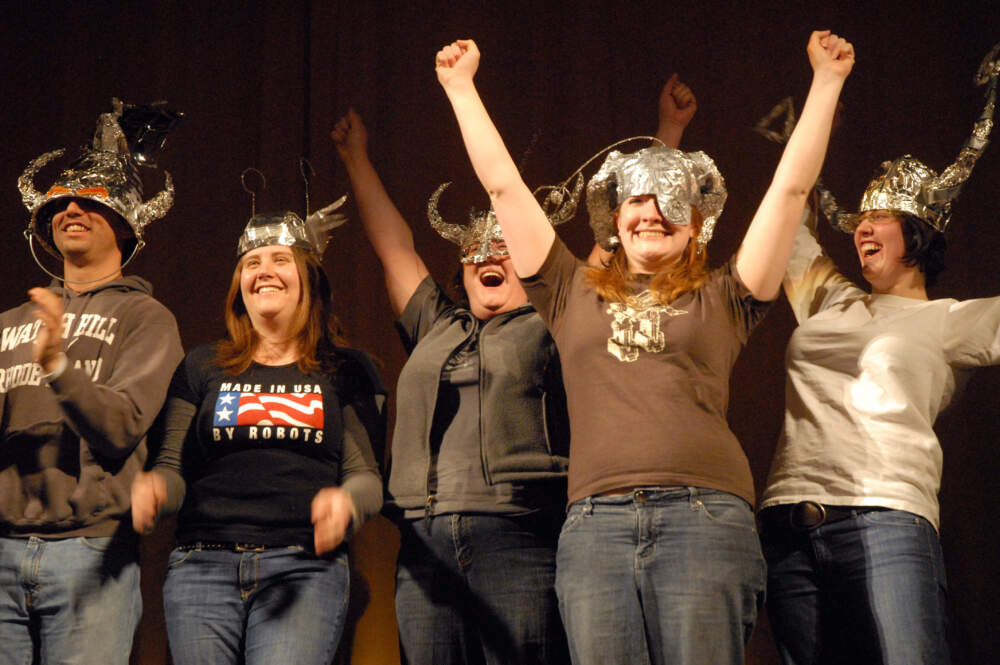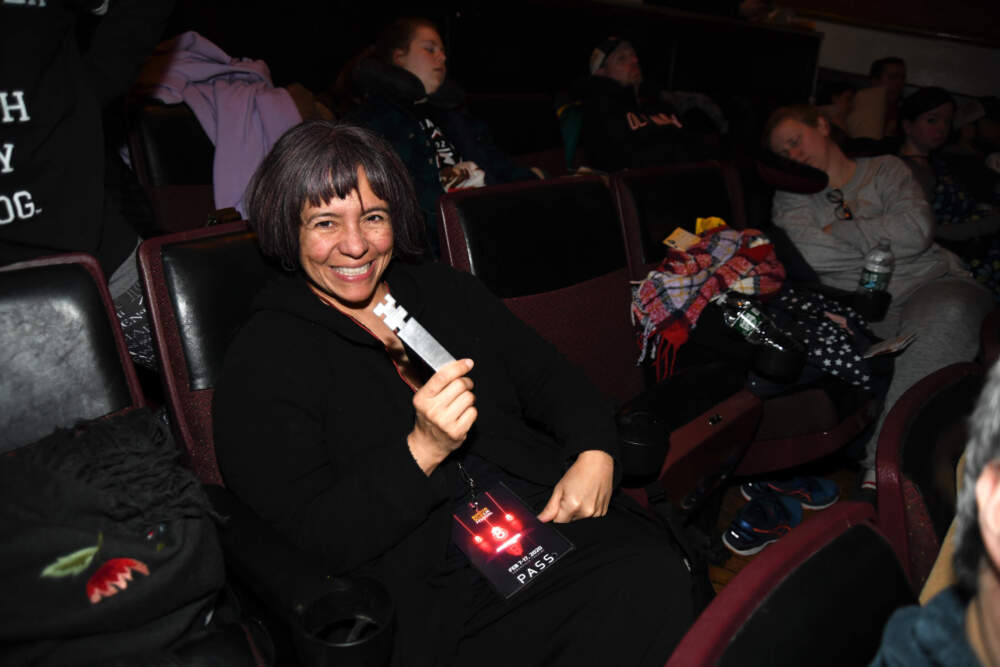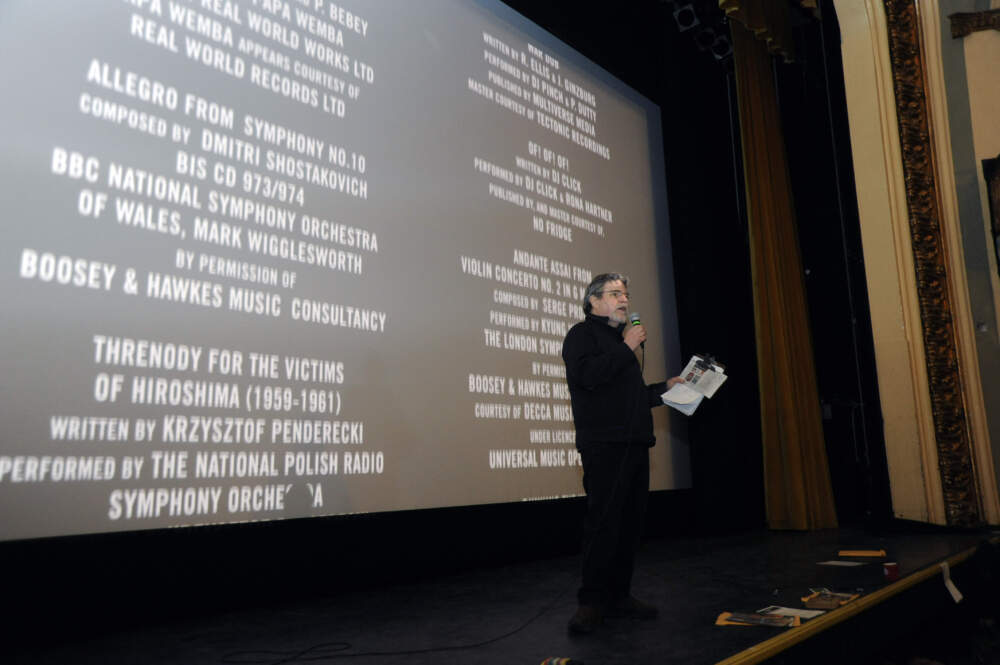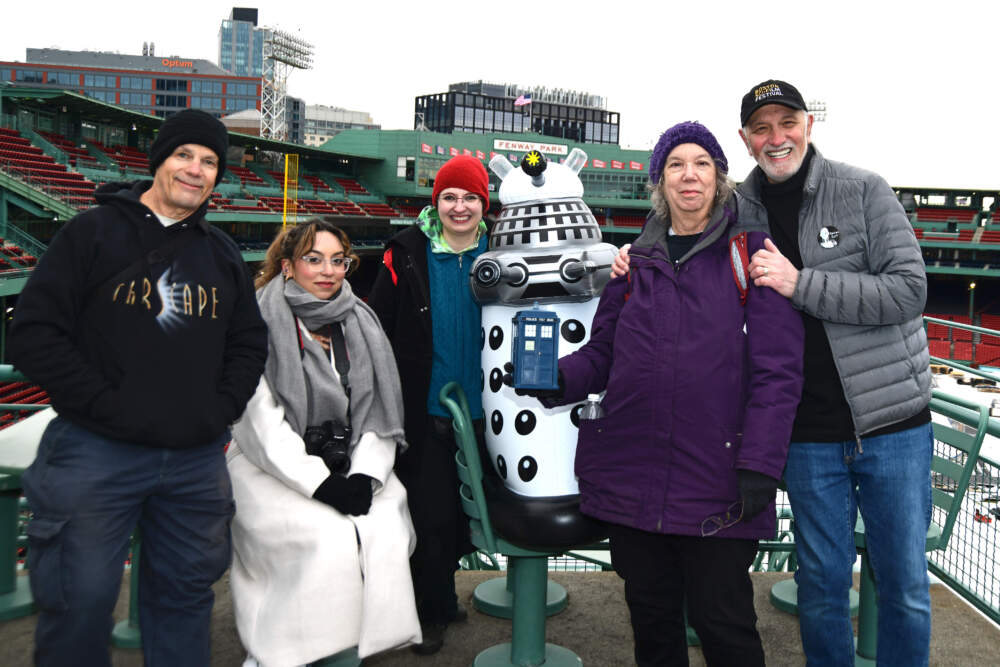Advertisement
At 50, Boston Sci-Fi Film Festival still runs on 'pure fun'

The Boston Science Fiction Film Festival turns 50 this year, making it Boston’s oldest film festival and America’s longest-running genre festival. It’s also likely Boston’s jolliest fest, where people of every and any background set aside their inhibitions and embrace the “pure fun” of things like tinfoil hats and alien mating-call contests.
Held at the Somerville Theatre and other Davis Square venues from Feb. 12-17, typical film fest activities — 10 feature-length and seven short sci-fi movie programs, along with panels and parties — culminate with the entirely unique Sci-Fi Marathon, a solid day of movies and goofy rituals enacted by old-timers and newbies alike.

First there’s the line to get in. One committed fan camps out the night before to always be first in line. “You're all freezing. You've got your blankets. Everyone's got their coolers,” says Suzzanne Cromwell. She started attending the ‘Thon, as it’s affectionately called, in the ‘80s for its magnetic sense of community. “If you are someone who feels marginalized or feels like you don't fit in … you will be able to make those friends and you will feel like you belong,” she says.
The ‘Thon line-up, announced in advance and programmed separately from the festival’s previous four days, spans cinema’s history and styles. Its 12 feature films cover sci-fi themes like time travel, “big bugs,” mutant chemistry, outer space and the future. Only one film repeats annually, and it always follows a countdown and the spicy blast of an Atomic Fireball candy: Warner Brothers’ 1953 cartoon “Duck Dodgers in the 241/2 Century.”
When Daffy Duck lights up the screen, Cromwell says her stomach tickles with anticipation. “It's starting. It's Sunday, and you're going to be here 24 hours, and it's just like, promise is waiting,” she says.

But it’s not just Daffy that makes SF50 special for Cromwell. She credits her love of movies to her father, who served as an off-duty projectionist for the U.S. Air Force. He passed away about a year ago. The ‘Thon’s first feature, “The Day the Earth Stood Still” from 1951, happened to be his favorite. “I'm going to be sitting next to my mom and holding her hand and watching that film in a very special way with these amazing people around me,” says Cromwell.
She’s talking about her relations — her 86-year-old mom, husband, and 10-year-old son will be there — but she’s also talking about her Sci-Fi family.
“That’s where kinship comes in,” says festival founder and director Garen Daly. He and everyone interviewed mention how a rare bond has helped the volunteer-run festival persevere for five decades. Though many work year-round behind the scenes, he says the ‘Thon coalesces the group like “Brigadoon.” “Every year, out of the mists of the snow and the miserable New England weather, we get together to have a warm, lovely village.”
Advertisement
Daly has been involved since SF3, or 1978, when he served as house manager for Cambridge’s storied Orson Welles Cinema. A week of “Horror and Science Fiction” had been collapsed into 24 consecutive hours. After fire took down the Welles in 1987, the annual event bounced around venues and remained a marathon until 2007, when under his direction, it became the final day of a full-blown festival. (I cannot crack the numbering of this fest, which Daly explains had a mistake from the beginning. But it is at least 50 years old.)

He adds that in New England, “ if you haven't been there for a couple of generations, you're still an outsider.” He likes that the festival has crossed that threshold. But he and others involved since the earliest years acknowledge a need to pass the torch “to a younger generation who share the same kind of philosophies that we have, but with a different perspective and a different kind of energy.” Two days before the launch of SF50, Daly announced his retirement; an announcement of his successor will come before next year's festival.
Many other volunteers’ personal history intertwines with the festival's evolution. For example, Sci-Fi office manager Sue Janowitz met her husband at SF3. She describes frustration with a movie “gratuitously carving up women's bodies… I was the first one who walked out, followed by about a third of the audience, including [my future husband], because he was worried I was leaving.” They married the year of SF7 and often attended together.
Mark Sherwood, who directs the Sci-Fi podcast, clocks his ‘Thon tenure back to the late ‘80s, at SF14. Now it’s an all-out family affair, peaking with as many as 20 or 25 relatives from multiple generations in attendance. He says this year his niece will “give her 3-year-old twins to grandma for the night.” His advice to relative newcomers, like his own son? “Wear comfortable clothes, bring a pillow, bring a blanket.” He jokes, “It’s just like a regular movie-going experience, you know, times 12.”
“Whether the snowpocalypse, marriages, divorces, children, I have never missed a marathon,” says Robert Viagas. Though he lives in New York, he began attending in 1979, or SF4. For him, it’s all about audience participation. “You know what we do when the monster comes out on screen, right? We have our ray guns! And we shoot the monster,” he says, lifting his ray gun into the Zoom frame with a smile.
Of the 23 books Viagas has written in his professional life, mostly about Broadway and theater culture, one focuses on the importance of audiences. With that priority in mind, he says he jumped at the chance to join forces with the festival’s photographer and archivist Harry O. Lohr Jr. to create the book, “It Came from the Orson Welles: Commemorating 50 Years of the Boston Science Fiction Film Festival and Marathon.”

The book contains a deep dive into Sci-Fi history, hundreds of photographs (from Lohr’s cache of more than 20,000), a sci-fi timeline, and personal essays by the authors. Viagas says they will make several presentations at this year’s festival and will bring dust jackets to autograph. They expect the book to be ready by April.
In one essay Lohr writes how he fell in with the genre as a child, watching double features at the YMCA to steer clear of the “semi-mean streets of Coatesville,” Pennsylvania. But also, sci-fi held his interest. “Happily, sci-fi subsumes most other genres—dramas, comedies, noir, westerns, horror films, ‘talky movies,’ action-packed blockbusters, romances, and romantic comedies,” he writes.
Like Lohr, Angela Burgess also sees the expansiveness of the genre as a strength, though she confesses she’s not a “hardcore sci-fi buff.” Still, after a stint with Tribeca and a move to Boston, she began programming the festival’s contemporary feature films in 2019. She appreciates this year’s opening night documentary, “Small Town Universe,” for how it pits modernity against tradition. For some high-powered telescopes to function, a town in West Virginia must restrict internet and cell phone use. Some residents resist, whereas others relish the escape. In the film, Burgess sees themes about the future of America: technology, and science, and the tension around if the government will continue to fund research. Director Katie Dellamaggiore will attend to answer questions.
Burgess also recommends the dialogue-driven thriller, “The Strange Dark,” about two secret agents who want to track down a scientist for stumbling upon information that the government wants to keep secret. Boston actor and Emerson College drama professor Bates Wilder plays one of the agents. He and director Chris Messineo along with other talent will attend for post-film conversation.
Ten years ago, Cromwell started programming the Sci-Fi short films. One of her favorites from this year, “I’m Not a Robot,” just received an Academy Award nomination for Best Live Action Short Film. In the film, a CAPTCHA filter, designed to tell humans from bots, prevents a woman from entering a website. A quick online quiz reveals some shocking news. Cromwell marvels at how much story the filmmakers packed into less than 15 minutes.
Cromwell also admires the stop-motion animation in “Les Bêtes” for its “visual feast” and the hand-drawn, haunting animation in “Laika,” about the Russian dog that traveled to space in Sputnik. While she no longer tries to organize the shorts by theme, she has noticed some trends. “I didn't see a single robot in a film this year.” The robots that one might associate with sci-fi are gone, she says, “replaced with humanoids, with AI, with… people.”
The growing on-screen blurring between humanity and technology amazes her. She traces the roots back to Data in “Star Trek.” But the trend also unnerves her. “Filmmakers are taking these AI and non-human beings and… they are caring for our children, they're caring for our elderly… they're bridging the gap between life and death.”
Whatever the outcome, “they take these concepts of simple science and make it personal and just make it possible.” For Cromwell, that’s sci-fi’s lure and why she’ll keep coming back and encouraging others to do the same. With a pillow, blanket, and a willingness to have fun, of course.


